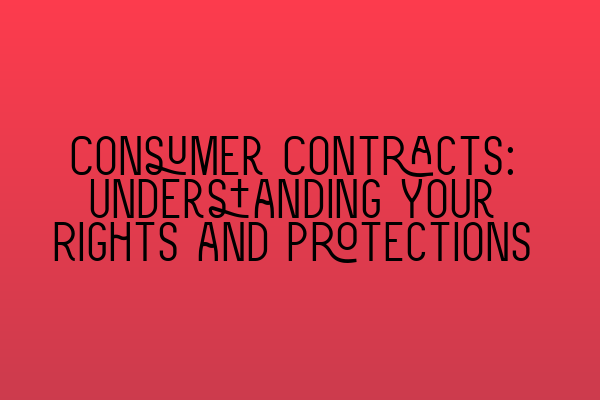Consumer Contracts: Understanding Your Rights and Protections
In today’s consumer-driven world, we often find ourselves signing contracts for various products and services. Whether it’s buying a new phone, signing up for a gym membership, or engaging a professional for a service, contracts are an integral part of our everyday lives. However, it’s essential to understand your rights and protections when entering into a consumer contract to ensure a fair and transparent transaction. In this blog post, we will explore consumer contracts and everything you need to know to navigate them confidently.
What is a Consumer Contract?
A consumer contract refers to an agreement between a consumer and a business for the purchase of goods, services, or a combination of both. These contracts can be written or oral, although it is always recommended to have written agreements to avoid misunderstandings. Consumer contracts may include terms and conditions regarding price, delivery, warranties, cancellation policies, and dispute resolution mechanisms.
Understanding Consumer Rights
As a consumer, you have specific rights and protections under the law. These rights aim to ensure that you are treated fairly and that businesses adhere to certain standards when dealing with consumers. Some key consumer rights include:
1. Right to Information: Businesses must provide you with clear and accurate information about their products or services, including pricing, terms, and conditions, and any additional fees.
2. Right to Quality: Goods and services provided to you must be of acceptable quality, fit for purpose, and match the description provided.
3. Right to Cooling-off Period: In certain situations, you have the right to cancel a contract within a specific timeframe without incurring any penalties or charges.
4. Right to Refund or Repair: If a product is faulty or does not meet your expectations, you have the right to a repair, replacement, or refund, as appropriate.
5. Right to Privacy: Your personal information should be protected and used in accordance with data protection laws.
It’s important to note that consumer rights can vary depending on your jurisdiction and the specific terms of the contract. Familiarize yourself with your country’s consumer protection laws to ensure you understand your rights fully.
What to Look for in a Consumer Contract?
Before signing any consumer contract, it’s crucial to review the terms and conditions carefully. Here are some key points to consider:
1. Price and Payment Terms: Ensure you are aware of the total cost of the product or service, including any additional charges or fees. Clarify the payment terms, schedule, and any penalties for late payments.
2. Delivery and Shipping: If you are purchasing a physical product, understand the delivery timelines, shipping costs, and any conditions related to product acceptance upon delivery.
3. Warranty and Guarantees: Check if the product or service comes with any warranties or guarantees. Understand the coverage, duration, and any limitations or conditions.
4. Cancellation and Refund Policies: Determine the cancellation policy, including whether there is a cooling-off period and any associated charges or requirements for cancellations. Be aware of the refund process and any applicable fees or deductions.
5. Dispute Resolution: Review the mechanism for resolving disputes, whether through negotiation, mediation, or arbitration. Ensure it is fair and impartial.
If you have any doubts or concerns about the terms and conditions of a contract, seek legal advice before proceeding.
Taking Action in Case of Disputes
In the unfortunate event of a dispute arising from a consumer contract, there are steps you can take to protect your rights and seek resolution:
1. Communication: Contact the business initially to discuss your concerns and attempt to resolve the issue directly.
2. Documentation: Keep copies of all relevant documents, such as invoices, emails, and receipts. These will serve as evidence in case the dispute escalates.
3. Mediation: Consider engaging in mediation to resolve the dispute amicably. Mediation involves a neutral third party facilitating a discussion between you and the business to find a mutually agreeable solution.
4. Legal Action: If all else fails, you may need to explore legal options, such as filing a complaint with a regulatory body or pursuing a lawsuit. Consult with a contract law solicitor to guide you through the legal process.
Knowledge is Power
By familiarizing yourself with your consumer rights and understanding the terms and conditions of consumer contracts, you can protect yourself from unfair practices and make informed decisions. Remember to always read contracts thoroughly, ask questions if something is unclear, and seek legal advice when necessary.
For further resources and preparation materials on contract law, we recommend the following related articles:
– SQE 1 Practice Exam Questions
– SQE 1 Practice Mocks FLK1 FLK2
– SQE 2 Preparation Courses
– SQE 1 Preparation Courses
– SRA SQE Exam Dates
Remember, knowledge is power when it comes to consumer contracts!
